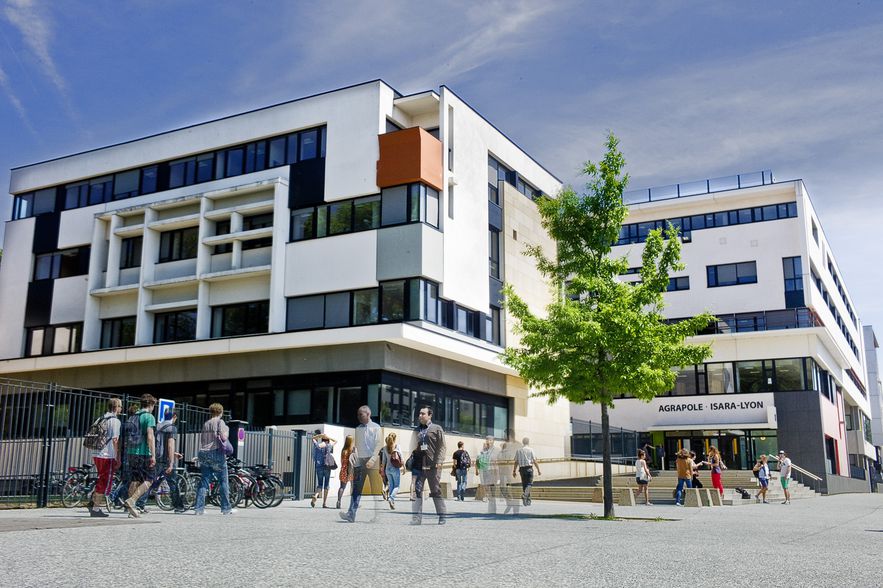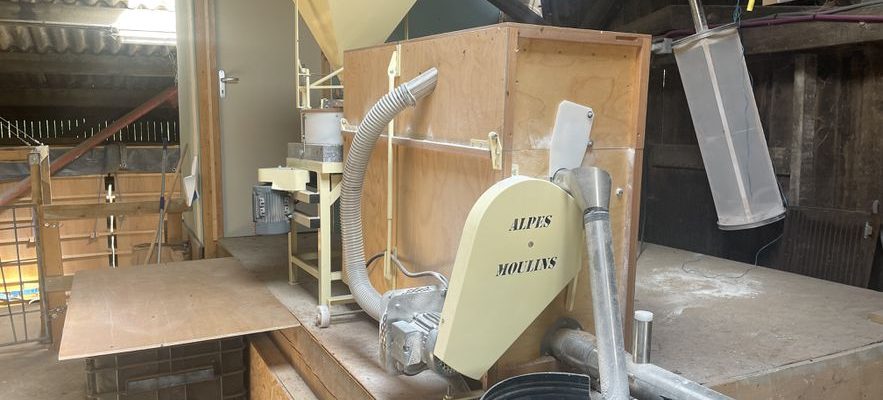Their first meeting dates back to September 2009. At the time, Robin Collombet, Victor Lavenant and Antoine Fèvre found themselves on the benches of the Higher Institute of Agriculture Rhône-Alpes (Isara), a school located in Lyon, which for more than 50 years has been training the agricultural and agri-food engineers of tomorrow. Between two lessons in the biology of organisms and the geobiosphere, the group of friends thinks about its future. After internships in the agricultural sector, the takeover of a farm on leaving the establishment, whose course is spread over five years, seems obvious. However, none of the three comes from this background. Their parents are a technician in a nuclear power station, a fruit buyer abroad, a salesperson, a midwife… nothing predestined them for this profession.
But the hoped-for transition will not happen immediately. The new graduates decided to go in opposite directions after school in 2014. Robin joined an international association specialized in agricultural development, before leaving for Laos in research and development, while Victor became a professor of life sciences and the Earth after obtaining his CAPES. Antoine joined a land development and rural establishment company (Safer). It was not until eight years later, in January 2022, that the former classmates met, about twenty kilometers from Lyon, in the heart of the Monts du Lyonnais, in Saint-Martin-en-Haut, to give birth to their exploitation project.
The latest generation mill of the “Le Binocle” agricultural group.
© / The Express
They then took over a dairy farm there, whose owners retired, and settled in a joint farming group (Gaec), which they called “La Binocle”. Around, under the already crushing sun at the beginning of June 2023, fields as far as the eye can see. On site, the three young farmers carried out a year of work to accommodate their ewes who produce the milk for their cheese production workshop installed on the site. The wheat, which grows on the 35 hectares of the farm, is used for the bakery, which the three associates trained late in life and on purpose. “The idea will be to each do a week of baking, one of cheese, then one of animal management, to avoid routine”, explains Robin Collombet in front of the brand new oven which sits not far from the enclosure of the sheep, and from which breads combining several cereals come out every day. Upstairs, a state-of-the-art mill transforms the wheat into flour, which is then automatically dispersed into bags.
A virtuous model called to multiply
Here, everything is done on site. Then the products go to the markets or to the stores in Lyon and the region. A direct sale has also been introduced to the delight of local residents. “We have lots of projects in mind, but we can’t tackle everything head-on. We want to be independent in the future, on everything that is food in any case”, says Robin Collombet. A virtuous circle to which the three young farmers were absolutely attached, in the image of what the new generation of farmers who are about to take over in France want to initiate.
Hurry up. Within 10 years, 166,000 farmers will have retired, ie more than a third of the current workforce. At Isara, we support this revolution that is coming for French farms. This is reflected first in the profile of future operators. “We recruit more and more people from urban areas. And inevitably, new forms of exploitation arrive. And then there are the students, sons or grandsons of farmers, who have in a corner of the head the idea of continuing the family tradition, but not in the same way”, notes Christophe David, the deputy director of the establishment. Of the 3,632 active engineers from Isara, 8% now have a first activity as farmers. In the promotion of Robin, Victor and Antoine, 15 have settled, more than 10% of the total. Some students have a very concrete project in the boxes, sometimes already on track.
The example of Robin, who also taught at Isara, has also been emulated. “I had him in class. He was someone who inspired us in training,” recalls Sébastien Galland, a 5th year student. This grandson of farmers, originally from Burgundy, started beekeeping before the start of his training. At Isara, which he joined after an agricultural high school, he was able to experiment and put into practice agroecology, a dear theme defended by the establishment for more than 15 years. “With school, I saw honey, my final product, in another way. I lacked a systemic vision and I couldn’t prioritize the different issues. The strong point here: we don’t ask engineers to be good everywhere, we ask them not to be bad anywhere”, explains the young entrepreneur who defends an ecological mode of production, respectful of ecosystems. During an internship in Austria, for example, he trained in hyperthermia, a method of treatment against dust mites, which makes it possible to dispense with synthetic inputs.
His classmate, Guillaume Rimaud, also has his project well in mind. His parents run a dairy farm in Ain, whose production from 100 cows is intended for the manufacture of artisanal ice cream. In a year and a half, Guillaume will take over the farm with his cousin, and knows where he wants to go. “The idea is to diversify the sources of production. We want to set up anaerobic digestion and use the resources of the territory to produce energy from waste, then supply our laboratory. The objective is to move towards food self-sufficiency”, he explains.
Projects still in the embryonic stage
Other students are still at the embryonic stage of reflection. The Isara then guides them in their choices, presenting them with all the cards at their disposal. This Thursday, June 1, a round table on collective farms is organized. During the catch-up period, several students who were not concerned made the trip. This mode of installation could, in the future, become more and more preferred. “It’s reassuring to be with several people. This makes it possible to have different and complementary workshops, and therefore to create a stable system”, explains Maëla Naël, an agricultural engineer by training and author of Collective farms, the (very) practical guidewhich occurred during the exchange.
Because the challenge today is to succeed in attracting new talent. “Farmers of yesteryear agreed to work 80 to 100 hours a week, but this is no longer the case today,” says Christophe David. This is the issue that Perrine Vandenbroucke, teacher-researcher at Isara, is interested in, who is leading a research project on the major challenges of the renewal of entrepreneurial dynamics in agriculture: “Our objective is to reveal the meaning of the profession and the resources that can support renewal in this sector. But also to develop portraits of farmers who have succeeded in flourishing in this work to also change the representations.” A job that could help convince and reassure students who are still too cautious about the idea of taking the plunge and becoming a farmer.
In any case, some already know that they will one day or another install their farm. This is the case of Coline and Soizic, currently in Hungary for an Erasmus exchange. Neither of them come from the middle. The first does not immediately aim for a career as a farmer and wishes to gain experience with a first experience in consulting in particular. But the project is already well designed, with the objective of taking over a dairy farm. “I find it highly rewarding to master the entire processing chain, from the grass that my animal will eat to the finished product and the sale to the consumer. This is where the job takes on its full meaning. If we make fair milk to make milk, it is of less interest”, explains Coline.

The Rhône-Alpes Higher Institute of Agriculture (Isara) in Lyon.
© / isara
Soizic, she would like to settle in the tip of Cotentin or in Lower Normandy to become “peasant baker or do forestry with acid apple orchards”. Its motto: “Do systemic agriculture, that is to say take into account the system: biodiversity, the economic and social fabric around… That’s what sustainable agriculture is all about”. And Isara provides the keys necessary to achieve this: “The school does not give us so much theoretical knowledge, but above all a capacity for reasoning to ask the right questions, by building its model with the right reflexes and a global vision. .”
Hélène Brives, teacher-researcher at Isara for 10 years now, observes a real movement of installation among former students in recent years, often with the same pattern. “There is a small period when they need to go and see a little elsewhere and then they come back. And for the sons and daughters of farmers, the generation gap is not necessarily phenomenal. When you are 20 or 25 years younger than his parents, the latter are not necessarily retired when you are ready”, she underlines. For his part, Christophe David warns: “We will necessarily have to seek a diversification of activities which is more than necessary today”. In any case, the challenge promises to be considerable.
